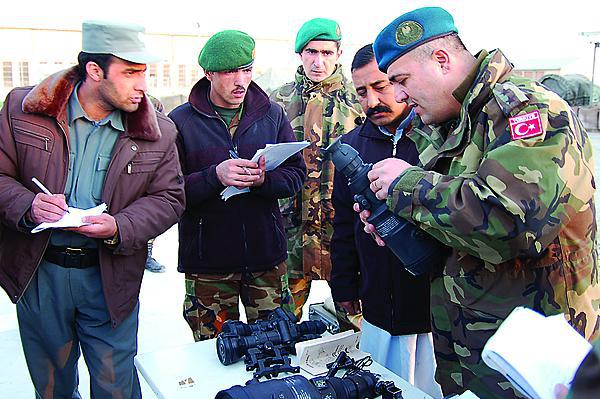Budgetary Pressures No Hindrance to Turkish Military
The need to upgrade the force prevails over austerity measures typical of other nations.
Turkey is pursuing a military modernization effort that runs unabated in the face of the global economic crisis. The NATO nation that sits astride Europe, Asia and the Middle East views internal and external threats as a greater danger than fiscal challenges, and it is continuing several programs that will introduce major new platforms built by Turkish industry.
Turkey’s annual national defense budget is about $15 billion. However, that is augmented by another $8 billion from the country’s Defense Industry Support Fund. Its military force, which is largely conscript, will shrink in numerical size but increase in professionalism and power through materiel upgrades.
Maj. Gen. Armağan Kuloğlu, TUA (Ret.), is a senior adviser to the Center for Middle Eastern Strategic Studies in Ankara. An army veteran who also served as a deputy undersecretary in the Ministry of Defense, Gen. Kuloğlu explains that Turkey’s military mission is to be able to react to security problems and crises that may arise, particularly in the face of growing uncertainties. These include both internal and external security concerns, he points out.
External concerns are highlighted by Turkey’s strategic location. Its waterfront borders are the Mediterranean Sea to the south, the Aegean Sea to the west and the Black Sea to the north. Its southern and southeastern land borders abut Syria, Iraq and Iran. Just last month, the violence afflicting Syria spilled over into Turkey as Syrian forces lobbed artillery shells into a Turkish village, killing several people and prompting retaliation from Turkey.
Gen. Kuloğlu emphasizes that, while deterrence has priority, Turkey must be able to project power for its security. “Because Turkey is in the Middle Eastern area, politics in this area [require the ability] to show power and, if needed, to use power,” he states. “This reality has to be taken into consideration.”
Accordingly, the country’s defense spending is not facing the budgetary knives that are being wielded in most other Western nations. “Turkey’s defense budget will not be cut,” the general offers. “Turkey will keep its defense budget at the same level.
“We are not a country in the middle of Europe,” he continues. “We are in the Middle Eastern region, and for that, we need a powerful military. For that reason, we cannot cut the defense budget.”
In addition to serving its own national security needs, the Turkish armed forces also participate in international peacekeeping missions, the general points out. Turkey long has been participating in peacekeeping operations throughout the world. As a full NATO member, Turkey also has been an associate member of the Eurocorps (SIGNAL Magazine, May 2012).
Turkey’s military comprises the army, the navy and the air force. Its navy also includes the marines. In addition, the gendarmerie and the coast guard are subordinate to the army and the navy in wartime. In peacetime, they operate as components to internal security forces under the Ministry of the Interior.
In terms of personnel, the military totals more than half a million members. This number breaks down to 35,000 officers, 70,000 noncommissioned officers, 40,000 specialist sergeants and enlisted men, 50,000 civil servants and 315,000 conscripts. The gendarmerie totals about 205,000 people, and the coast guard has 5,000. Adding these two Interior organizations in wartime brings the total of military personnel to more than 720,000.
Over the recent past, Turkey has been reducing the size of its military. Gen. Kuloğlu relates that the past 20 years have seen a reduction of 300,000 personnel, largely among conscripts. While 60 percent of the military still is composed of conscripts, that percentage likely will decline as the force shifts to one of a more professional nature. Within 10 years, the conscript-professional split may be 50-50. The shift toward a more professional military is a top priority for the armed forces, he says.
Part of that professional identity is a greater reliance on specialties, the general observes. The force is striving to establish multipurpose flexible and active units. Providing these units with high firepower is important.
Some infantry units in the army are being turned into commando units, he notes. The force is transitioning from one commando brigade and one airborne brigade to five commando brigades, and the gendarmerie has a commando brigade.
In five years, the Turkish military will be more capable technologically with fewer personnel, the general predicts. It will have more active units with greater firepower, and it will be able to engage in more diverse missions, particularly as a partner in international activities. And, it will be a more professional force.
Among priorities for electronics systems modernization are command, control, communications, computers and intelligence (C4I) and early warning systems. “Information technology is very important for the Turkish military,” Gen. Kuloğlu declares. Turkish industry is providing much of the advanced technology that is upgrading the force in this arena, he continues. While the goal is to have domestic sources provide advanced information technologies, Turkey does have to turn to foreign sources from time to time. These efforts may involve coproduction or cooperation in system development. He cites the United States and Europe as markets to which Turkey may turn to obtain technologies that it cannot produce domestically. Turkey continues to work within the NATO framework to increase interoperability among alliance allies.
Foremost among Turkish army modernization efforts are upgrades in armor. Much of the army still uses versions of the M-48, M-60 and Leopard tanks. While these have been or are being upgraded, Turkey is counting on building its own indigenous main battle tank, the Otokar Altay. The military seeks to build as many as 1,000 of these tanks in several increments. Meanwhile, the army continues to add new models of guns, weapons and missiles into its inventory, Gen. Kuloğlu adds.
One area that will increase in emphasis is army aviation, he predicts. Because the force is transitioning into multipurpose units that are more flexible, it will rely more on helicopters. The number of general purpose/utility helicopters is growing, and the army will be adding new cargo helicopters in 2014, including Chinooks. The army is adding SuperCobra helicopters, and an indigenous attack helicopter is being built by Turkish Aerospace Industries, or TAI. It will begin to join the army in 2014 with a goal of 50 helicopters being built over five years.
The navy is adding new submarines, anti-aircraft frigates and assault boats. Modernization activities will continue, the general says. The air force currently operates upgraded F-4 and F-16 fighter aircraft, most of which have been produced locally under license by TAI. Turkey is a member of the consortium building the F-35 Joint Strike Fighter, which it expects will replace the older aircraft.
That many of these Turkish armed forces upgrades are built by indigenous sources is part of a long-term thrust in Turkey. Gen. Kuloğlu allows that a near-term goal is for Turkish industry to provide 50 percent of the armed forces’ needs.
That domestic defense industry also is providing Turkey with export sales. The general notes that Turkish firms are exporting their defense technologies to several countries. These include Pakistan, Qatar, Saudi Arabia, Bahrain and the United States. Other countries may become export markets. Among the prime export technologies are radios and communication integration systems along with aircraft and helicopter parts.
The reason for increasing the domestic production of military technologies goes beyond building a thriving defense industrial base, Gen. Kuloğlu offers. Turkey wants to reduce its reliance on foreign sources so that it is not hindered if foreign political concerns seek to cut off defense sales to Turkey. “We don’t want to depend on other countries for this,” he states. “If we depend on other countries in wartime; if we have some problems [with the other countries], we cannot count on them.” He notes that in peacetime, Turkey usually can seek foreign military technologies, and it does so. However, if the country becomes embroiled in a war, then it runs the risk of the supplying country instituting an arms embargo—which has happened in the past.




Comments